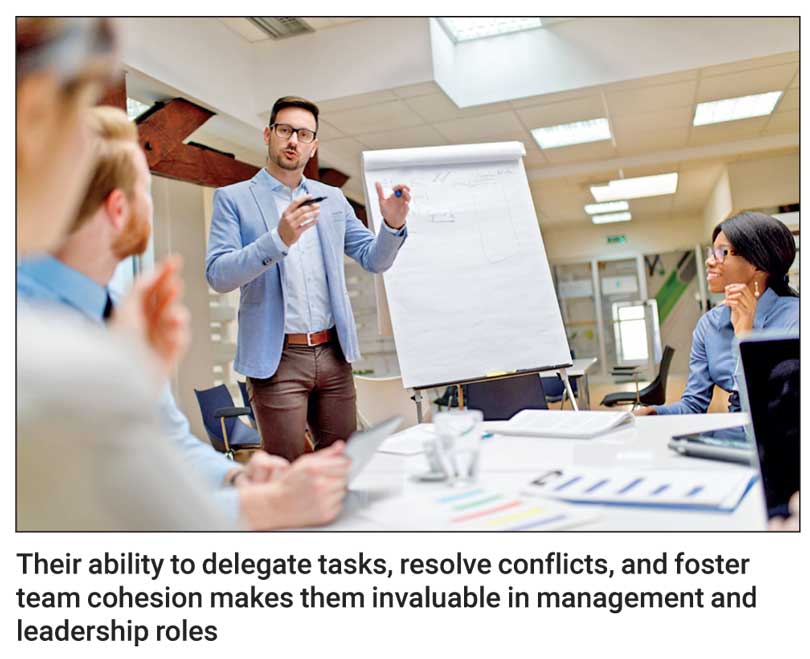Saturday Feb 21, 2026
Saturday Feb 21, 2026
Tuesday, 29 October 2024 02:05 - - {{hitsCtrl.values.hits}}

 In today’s context, we observe a growing number of ex-military personnel, both officers and other ranks, transitioning into the employment world in Sri Lanka after completing their agreed service period. Unfortunately, there is a noticeable lack of proper, systematic career guidance for these individuals. This results in the underutilisation of valuable human resources that could greatly benefit the country. Now more than ever, it is essential to provide them with the right exposure, making them more competent and confident in securing careers within the corporate sector, government, or overseas.
In today’s context, we observe a growing number of ex-military personnel, both officers and other ranks, transitioning into the employment world in Sri Lanka after completing their agreed service period. Unfortunately, there is a noticeable lack of proper, systematic career guidance for these individuals. This results in the underutilisation of valuable human resources that could greatly benefit the country. Now more than ever, it is essential to provide them with the right exposure, making them more competent and confident in securing careers within the corporate sector, government, or overseas.
The writer himself had the fortune of gaining military exposure during his early career, which built a solid platform for pursuing a successful profession in the corporate world. However, he emphasises that each individual is different—everyone’s career path needs to be aligned with their unique knowledge, skills, attitudes, and aspirations. The differences in how individuals’ brains are wired, influenced by experiences, education, and even innate tendencies, mean that career choices must be carefully considered. This is why he advocates for proper counselling or mentoring before beginning a career journey, to help individuals find the most suitable professions for them.
The objective of the writer is to create awareness about the competencies veterans can gain during their military service, which can be effectively applied for corporate success. He wishes to draw the attention of authorities and the corporate world to utilise this opportunity for the betterment of the country and businesses, while helping to effectively engage our valued human resources.
Leadership and team management
Military personnel are trained to lead with confidence, often in high-stress and complex situations. Veterans possess exceptional decision-making skills, enabling them to assess situations quickly and lead teams effectively. Their ability to delegate tasks, resolve conflicts, and foster team cohesion makes them invaluable in management and leadership roles.
Strategic planning and execution
Veterans excel in long-term strategic thinking and operational efficiency. Their experience in planning and executing missions with limited resources directly translates to corporate strategy and project management. They understand the importance of aligning objectives with available resources to achieve optimal outcomes.
Adaptability and resilience
The unpredictable nature of military service hones adaptability and resilience. Veterans are adept at handling change, whether in a battlefield or a boardroom. Their ability to remain calm under pressure and pivot strategies when necessary makes them highly adaptable in dynamic corporate environments.
Problem-solving and critical thinking
Problem-solving is at the core of military operations, where quick thinking can make all the difference. Veterans are trained to assess situations, identify problems, and devise practical solutions in real-time. This ability to think critically and innovatively is crucial for navigating corporate challenges and seizing opportunities.
Decision-making under pressure
In the military, decisions often need to be made swiftly and with precision, sometimes in life-or-death situations. This sharpens veterans’ decision-making capabilities, allowing them to weigh risks, analyse data, and make informed decisions quickly. This competency is highly valuable in corporate roles that require agility and sound judgment.
Emotional intelligence and interpersonal skills
Building strong relationships is essential in military teams, where trust and communication are key to success. Veterans develop a high level of emotional intelligence, allowing them to empathise with others, manage emotions, and navigate complex interpersonal dynamics. This skill set is particularly valuable in leadership, customer relations, and team management roles in the corporate world.
Communication skills
Effective communication is a cornerstone of military operations. Veterans are trained to convey information clearly and concisely, ensuring that everyone understands their roles and responsibilities. This proficiency in communication is critical in corporate environments, where clarity can prevent misunderstandings and enhance collaboration.
Technical expertise and logistics management
Many military roles involve advanced technical training and logistics management. Veterans with these backgrounds bring expertise in areas like IT, engineering, and supply chain management, making them well-suited for technical and operational roles in corporate settings.
Emotional resilience and problem-solving
Handling adversity is second nature to veterans. Their experiences in high-pressure environments build emotional resilience and sharpen their problem-solving abilities. Veterans can thrive in corporate settings that require quick thinking and the ability to navigate challenges with a calm, solution-oriented mindset.
The importance of mindset
While military training lays a strong foundation for success, an individual’s willpower and positive mindset play a crucial role in their career journey. The military teaches resilience and determination—qualities that are vital when facing new challenges in the corporate world. By maintaining a positive outlook and believing in their abilities, veterans can overcome obstacles and thrive in their new roles. A growth mindset, combined with the skills they acquire during their service, allows veterans to excel in a variety of professional environments.
Veterans possess a broad range of competencies—leadership, strategic planning, problem-solving, emotional intelligence, and a positive mindset—that can be effectively applied in the corporate sector. The writer emphasises that authorities and the corporate world should tap into this opportunity not only for the success of businesses but also for the betterment of the country. Helping veterans transition into meaningful careers will ensure that Sri Lanka makes the most of its valuable human resources, fostering both national development and corporate growth.
(The writer is a past President of CIPM Sri Lanka and currently heading Human Resource and Administration functions at Sri Lanka Insurance Corporation Ltd.)